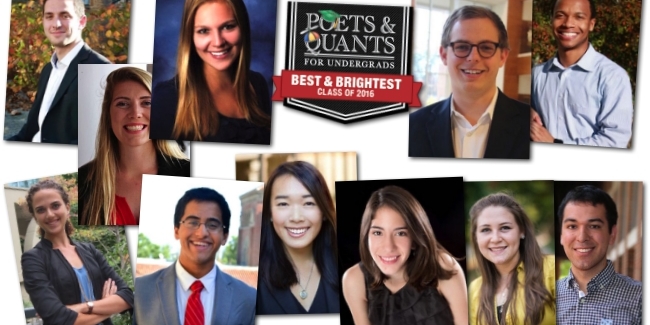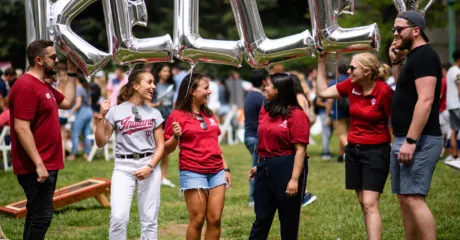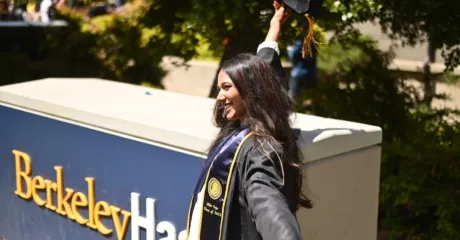The Wharton School at the University of Pennsylvania has been a perennial power of our undergraduate ranking, topping the list of the Best Undergraduate Business Schools for six straight years. This year, the B-School took the No. 1 spot in this year’s 2023 rankings, up two places from its No. 3 place last year. Wharton remains one of the best programs in the country – they have tough admissions standards, enroll top students, give them a top-notch undergraduate business education, and place them into coveted jobs.
Of the three methodological categories, Wharton placed No. 1 in both Admissions and Career Outcomes. At 4.5%, Wharton had the most selective acceptance rate of all undergraduate programs – more selective than their 6.30% rate last year. As far as average SAT scores go, this year’s class reported an average score of 1528 – up from last year’s score of 1519.
Up from last year’s 99%, every single student (100% of the Class of 2023) landed at least one business-focused internship before graduation. Wharton also placed 98.47% of their 2023 graduates in full-time positions — up ever so slightly from last year’s 98.43% for the Class of 2022. Wharton reported the highest average salaries post-graduation, with 2023 graduates earning a whopping $107,215 on average.
SENIOR CAPSTONE PROJECT MOST POPULAR ‘SIGNATURE EXPERIENCE’ AMONG RECENT GRADS
Among the respondents to our survey, 77.42%, reported having at least one “signature experience.” Alumni mentioned launching startups and working on research projects as some of those signature experiences. But the most popular experience mentioned was the senior capstone.
“There were about 80 students participating, divided into eight teams, each representing a company,” said the alum. “In addition to negotiating and forming alliances with other companies, the simulation included interaction with simulated governments, as well as environmental impacts. We also had alumni present who constituted the board of directors for each company and served as advisors after a presentation made to them, as well as a leadership facilitator who sat in all the team discussions and helped us reflect on the experience and our communication and teamwork skills at the end of the program. It was quite superbly executed.”
When we asked alumni this year how much other alumni have assisted them throughout their careers, Wharton also earned the top average score of all of the ranked schools — a 9.79 out of 10.
A whole 96.77% of current alumni said their first jobs after graduation were in their desired industries, and 83.87% said their jobs were at their desired company, which was high compared to other schools.
NEARLY TWO-DOZEN CONCENTRATIONS AND 50 STUDENT-RUN ORGANIZATIONS AND CLUBS
Wharton boasts a flexible curriculum. Students are required to complete 22 business courses, 10 electives based in liberal arts and sciences, and five more unrestricted electives anywhere in the Penn community. Wharton offers nearly two dozen concentrations including traditional business fundamentals like accounting, finance, and marketing as well as relatively new areas like social impact and responsibility, managing electronic commerce, and business analytics.
For out of the classroom experience, Wharton also has nearly 50 student-run organizations and clubs including the Black Wharton Undergraduate Association, Social Impact Consulting, and Wharton Women.
Wharton became the first top-ranked business school in 2020 to appoint a black woman as dean when it announced the hiring of Erika James. A former dean of Emory’s Goizueta Business School, James boosted faculty diversity while increasing programs and fundraising during her time at Emory. She has already made national headlines for the potential she has to put diversity and inclusion at the forefront of the Wharton experience.
According to our rankings, Wharton continues to be the creme of the business school crop for undergraduate business education.
Alumni say:
“The new Wharton curriculum integrated several classes across my four years, culminating in an engaging team capstone project. I really appreciate the thoughtfulness that went into developing these classes, as the lessons learned have been very valuable in my career and there was clear cohesion in the curriculum.”
“I had a unique privilege to be in the first class of Penn-Wharton Public Policy Research Scholars (PPRS) for which I completed a policy capstone my senior year. This was a certificate program allowing accepted students from the four different undergraduate schools at UPenn to delve into public policy and research during our sophomore through senior years through lectures, skill training, travel opportunities, and special industry guests. Finally, although not directly connected to Wharton, I had the opportunity to work at Perry World House as a Student Fellow ultimately due to the generosity of Wharton and other UPenn alumni.”
“I got to learn Data Science + Statistics at an MBA level, and completed a project as a Volunteer Data Scientist Consultant with Planned Parenthood. I now do a lot of work with data + tech, so having the experience of working with a real client to solve a real data challenge for them gave me a lot more to talk about in interviews, and enabled me to share real world examples of how I could contribute to the organization I was applying to.”
“I wrote two theses, one on Islamic Finance and another on the business problems behind machine learning in healthcare. They were pivotal in allowing me to develop in-depth, SME-level expertise in a particular sub-area which I was then able to deploy in the workplace, setting me apart from others and allowing me to rise faster.”
“I participated in a Global Modular Course that had both MBAs and undergrads – it was a Tech and Entrepreneurship program in Bangalore, India, and it was hosted in the campus of the Indian Institute of Management, Bangalore (IIM-B), which is the second most prestigious business school in India. We had exposure to several different Indian startups and VCs, as well as the opportunity to work on a project for them. It was also really cool to interact with some IIM-B MBA students who were part of the course as well – it helped build connections in different countries and helped me understand the Indian startup ecosystem better.”











